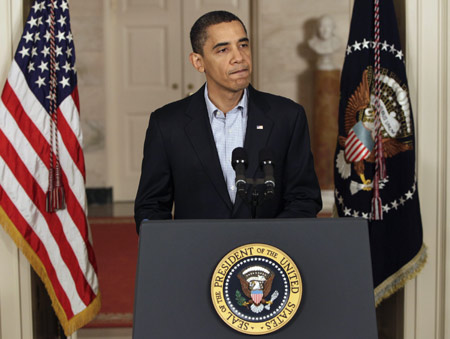No easy feat for Obama to close healthcare deal
After weeks of debating, the U.S. Senate passed a landmark healthcare bill on Thursday, which would greatly expand healthcare coverage and usher in the biggest change in the U.S. healthcare system in decades.
 |
|
U.S. Senate majority leader Harry Reid (C) speaks during a news conference in Washington Dec. 24, 2009. The U.S. Senate on Thursday passed a landmark healthcare bill, which will expand healthcare insurance coverage to 94 percent of the Americans and could usher in the biggest change in U.S. healthcare in decades. [Xinhua/Zhang Yan] |
The rare Christmas-eve vote sent a hard-won victory for President Barack Obama and his fellow Democrats, marking an important step toward the end of the deal. But the final step -- reconciling the Senate bill with the one passed by the House of Representatives last month -- remains a challenge.
'Incredibly close'
Obama said after the Senate vote that the country was "incredibly close to making health insurance reform a reality."
Indeed, Obama has made advancement on the issue further than any of his predecessors.
Ever since Teddy Roosevelt proposed healthcare reform in 1912, seven presidents had attempted to overhaul the country's flawed healthcare system, but no reform legislation had passed any chamber of Congress.
Calling the vote "historic," Obama said it will "bring us to the end of a nearly century-long struggle to reform America's healthcare system."
"With passage of reform bills in both the House and the Senate, we are now finally poised to deliver on the promise of real, meaningful health insurance reform that will bring additional security and stability to the American people," said Obama.
 |
|
U.S. President Barack Obama makes a statement on health care and climate change at the White House in Washington December 19, 2009. [Xinhua/Reuters Photo] |
The president said the legislation would hold the insurance industry accountable while workers will not have to worry about losing coverage if they lose or change jobs.
"Families will save on their premiums. Businesses that would see their costs rise if we do not act, will save money now and they will save money in the future."
This bill will also strengthen Medicare -- the health in suranceprogram for the elderly and disabled -- and extend the life of the program, making healthcare insurance coverage affordable for over 30 million Americans who do not have it, said Obama.
It will help reduce national deficit by as much as 132 billion U.S. dollars over the next decade, he claimed.
'Finish the job'
However, both the president and leading Democrats acknowledged that the Senate vote does not mean the healthcare legislation is a done deal and the next challenge will be "finish the job."
"We now have to take up the last and most important step and reach an agreement on a final reform bill that I can sign into law. And I look forward to working with members of Congress in both chambers over the coming weeks to do exactly that," said Obama.
Senate Majority Leader Harry Reid, a Democrat from Nevada, said Thursday's vote "is not the end of that process; it is merely the beginning."
He urged immediate action. "The American people and the American economy cannot afford for us to wait for next time -- because there may not be a next time," he said.
The task of merging the two versions will be taken up by a conference committee, which is expected to be dominated by senior lawmakers from both chambers close to Reid and House Speaker Nancy Pelosi, a Democrat from California.
Both chambers then would have to approve a final version before it goes to Obama to be signed into law.
Obama had wanted to sign the legislation by this yearend. But his senior advisers acknowledged that would not happen.
"We're going to have some work to do when we come back from the Christmas-New Year break" said David Axelrod, Obama's strategic advisor.
After Thursday's vote, the Congress will take a weeks-long recess until mid-January, and Obama's best hope is to sign the bill into law before delivering his first State of the Union address at the end of January or in the beginning of February.
 0 Comments
0 Comments







Comments